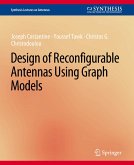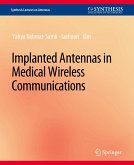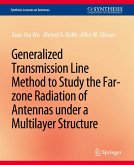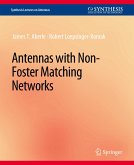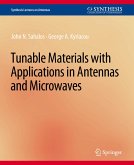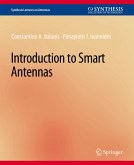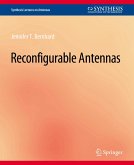Ahmed H. Abdelrahman received B.S. and M.S. degrees from The Department of Electrical Engineering, Electronics and Communications, Ain Shams University, Cairo, Egypt, in 2001 and 2010, respectively, and he received a Ph.D. degree in engineering sciences from The Department of Electrical Engineering, University of Mississippi, University, MS, USA, in 2014. Dr. Abdelrahman is currently a research associate with the Antenna Research Group (ARG), in The Department of Electrical, Computer, and Energy Engineering, at The University of Colorado Boulder, Boulder, CO, USA. He also worked as a postdoctoral research associate for almost two years in The Department of Electrical and Computer Engineering at The University of Arizona, Tucson, AZ, USA. Additionally, he possesses over eight years of experience in Satellite Communications industry. He worked as a RF design engineer and a Communication System Engineer in building the low earth orbit satellite Egyptsat-1. His research interests include transmitarray/reflectarray antennas, mobile antennas, reconfigurable antennas, simultaneous transmit and receive (STAR) antennas, satellite communications, and thermoacoustic and millimeter-wave imaging. Dr. Abdelrahman was the recipient of the several prestigious awards, including the Third-Place Winner Student Paper Competition Award at the 2013 ACES Annual Conference, and the Honorable Mention Student Paper Competition at the 2014 IEEE AP-S International Symposium on Antennas and Propagation. Fan Yang received B.S. and M.S. degrees from Tsinghua University, Beijing, China, in 1997 and 1999, respectively, and a Ph.D. degree from the University of California at Los Angeles (UCLA) in 2002. From 1994âEUR"1999, he was a research assistant with the State Key Laboratory of Microwave and Digital Communications, Tsinghua University. From 1999-2002, he was a graduate student researcher with the Antenna Laboratory, UCLA. From 2002-2004, he was a post-doctoral research engineer and instructor with the Electrical Engineering Department, UCLA. In 2004, he joined the Electrical Engineering Department at The University of Mississippi as an assistant professor, and was promoted to a tenured associate professor. In 2011, he joined the Electronic Engineering Department at Tsinghua University as a professor, and has served as the Director of the Microwave and Antenna Institute since then. Prof. Yang's research interests include antennas, surface electromagnetics, computational electromagnetics, and applied electromagnetic systems. He has published over 200 journal articles and conference papers, six book chapters, and three books entitled Scattering Analysis of Periodic Structures Using Finite-Difference Time-Domain Method (Morgan & Claypool, 2012), Electromagnetic Band Gap Structures in Antenna Engineering (Cambridge Univ. Press, 2009), and Electromagnetics and Antenna Optimization Using Taguchi's Method (Morgan & Claypool, 2007). Prof. Yang served as an associate editor of the IEEE Transactions on Antennas and Propagation (2010âEUR"2013) and an associate editor-in-chief of Applied Computational Electromagnetics Society (ACES) Journal (2008âEUR"2014). He was the Technical Program Committee (TPC) Chair of 2014 IEEE International Symposium on Antennas and Propagation and USNC-URSI Radio Science Meeting. Dr. Yang has been the recipient of several prestigious awards and recognitions, including the Young Scientist Award of the 2005 URSI General Assembly and of the 2007 International Symposium on Electromagnetic Theory, the 2008 Junior Faculty Research Award of the University of Mississippi, the 2009 inaugural IEEE Donald G. Dudley Jr. Undergraduate Teaching Award, and the 2011 Recipient of Global Experts Program of China. Atef Z. Elsherbeni received an honor B.Sc. degree in electronics and communications, an honor B.Sc. degree in applied physics, and a M. Eng. degree in electrical engineering, all from Cairo University, Cairo, Egypt, in 1976, 1979, and 1982, respectively, and a Ph.D. degree in electrical engineering from Manitoba University, Winnipeg, Manitoba, Canada, in 1987. He started his engineering career as a part time Software and System Design Engineer from March 1980 to December 1982 at the Automated Data System Center, Cairo, Egypt. From January to August 1987, he was a post doctoral fellow at Manitoba University. Dr. Elsherbeni joined the faculty at the University of Mississippi in August 1987 as an assistant professor of electrical engineering. He advanced to the rank of associate professor in July 1991, and to the rank of professor in July 1997. He was appointed as Associate Dean of Engineering for Research and Graduate Programs from July 2009 to July 2013 atthe University of Mississippi. Dr. Elsherbeni joined the Electrical Engineering and Computer Science Department at Colorado School of Mines in August 2013 as the Dobelman Distinguished Chair Professor. He currently is the Electrical Engineering Division Director. He spent a sabbatical term in 1996 at the Electrical Engineering Department, University of California at Los Angeles (UCLA) and was a visiting Professor at Magdeburg University during the summer of 2005 and at Tampere University of Technology in Finland during the summer of 2007. In 2009, he was selected as Finland Distinguished Professor by the Academy of Finland and TEKES. Over the years, Dr. Elsherbeni participated in acquiring millions of dollars to support his research group activities dealing with scattering and diffraction of EM waves by dielectric and metal objects, finite difference time domain analysis of antennas and microwave devices, field visualization and software development for EM education, interactions of electromagnetic waves with human body, RFID and sensor Integrated FRID systems, reflector and printed antennas and antenna arrays for radars, UAV, and personal communication systems, antennas for wideband applications, and measurements of antenna characteristics and material properties. He is the co-author of the books Antenna Analysis and Design Using FEKO Electromagnetic Simulation Software, ACES Series on Computational Electromagnetics and Engineering, SciTech 2014, Double-Grid Finite-Difference Frequency-Domain (DG-FDFD) Method for Scattering from Chiral Objects, Morgan & Claypool, 2013, Scattering Analysis of Periodic Structures Using Finite-Difference Time-Domain Method, Morgan & Claypool, 2012, Multiresolution Frequency Domain Technique for Electromagnetics, Morgan & Claypool, 2012, The Finite Difference Time Domain Method for Electromagnetics with Matlab Simulations, Scitech, 2009 1st ed., and 2016 2nd ed. by IET, Antenna Design and Visualization Using Matlab, Scitech, 2006, MATLAB Simulations for Radar Systems Design, CRC Press, 2003, Electromagnetic Scattering Using the Iterative Multiregion Technique, Morgan & Claypool, 2007, Electromagnetics and Antenna Optimization using Taguchi's Method , Morgan & Claypool, 2007, Scattering Analysis of Periodic Structures Using Finite-Difference Time-Domain Method, Morgan & Claypool, 2012, Multiresolution Frequency DomainTechnique for Electromagnetics, Morgan & Claypool, 2012, and the main author of the chapters ""Handheld Antennas"" and ""The Finite Difference Time Domain Technique for Microstrip Antennas"" in Handbook of Antennas in Wireless Communications, CRC Press, 2001. Dr. Elsherbeni is a Fellow member of the Institute of Electrical and Electronics Engineers (IEEE) and a fellow member of The Applied Computational Electromagnetic Society (ACES). He is the Editor-in-Chief of the ACES Journal, and a past Associate Editor of the Radio Science Journal. He was the Chair of the Engineering and Physics Division of the Mississippi Academy of Science and was the Chair of the Educational Activity Committee for the IEEE Region 3 Section. He held the president position of ACES Society from 2013âEUR"2015.ayam Nayeri received a B.Sc. in applied physics from Shahid Beheshti University, Tehran, Iran, in 2004, an M.Sc. in electrical engineering from Iran University of Science and Technology, Tehran, Iran, in 2007, and a Ph.D. in electrical engineering from The University of Mississippi, University, MS, USA, in 2012. From 2008âEUR"2013, Dr. Nayeri was with the Center for Applied Electromagnetic Systems Research (CAESR) at The University of Mississippi. Prior to this, he was a visiting researcher at the University of Queensland, Brisbane, Australia. From August 2012 to December 2013 he was a postdoctoral research associate and instructor with the Electrical Engineering Department, îEUREURe University of Mississippi. From January 2014 to June 2015, he was a post-doctoral fellow with the Electrical Engineering and Computer Science Department, Colorado School of Mines, Golden, CO, USA. Dr. Nayeri joined the Electrical Engineering and Computer Science Department at Colorado School of Mines as an assistant professor in July 2015. His current research is in the areas of multifunctional and adaptive microwave circuits, wireless energy harvesting, active and wide-band antenna arrays, and adaptive beamforming. Dr. Nayeri is a member of IEEE, Sigma Xi, and Phi Kappa Phi, and has authored over 60 journal articles and conference papers. He has been the recipient of several prestigious awards, including the IEEE Antennas and Propagation Society Doctoral Research Award in 2010, the University of Mississippi Graduate Achievement Award in Electrical Engineering in 2011, and the Best Student Paper Award of the 29th International Review of Progress in ACES. Payam Nayeri received a B.Sc.in applied physics from Shahid Beheshti University, Tehran, Iran, in 2004, an M.Sc. in electrical engineering from Iran University of Science and Technology, Tehran, Iran, in 2007, and a Ph.D. in electrical engineering from The University of Mississippi, University, MS, USA, in 2012. From 2008-2013, Dr. Nayeri was with the Center for Applied Electromagnetic Systems Research (CAESR) at The University of Mississippi. Prior to this, he was a visiting researcher at the University of Queensland, Brisbane, Australia. From August 2012 to December 2013 he was a postdoctoral research associate and instructor with the Electrical Engineering Department, The University of Mississippi. From January 2014 to June 2015, he was a post-doctoral fellow with the Electrical Engineering and Computer Science Department, Colorado School of Mines, Golden, CO, USA. Dr. Nayeri joined the Electrical Engineering and Computer Science Department at Colorado School of Mines as an assistant professor in July 2015. Hiscurrent research is in the areas of multifunctional and adaptive microwave circuits, wireless energy harvesting, active and wide-band antenna arrays, and adaptive beamforming. Dr. Nayeri is a member of IEEE, Sigma Xi, and Phi Kappa Phi, and has authored over 60 journal articles and conference papers. He has been the recipient of several prestigious awards, including the IEEE Antennas and Propagation Society Doctoral Research Award in 2010, the University of Mississippi Graduate Achievement Award in Electrical Engineering in 2011, and the Best Student Paper Award of the 29th International Review of Progress in ACES.


